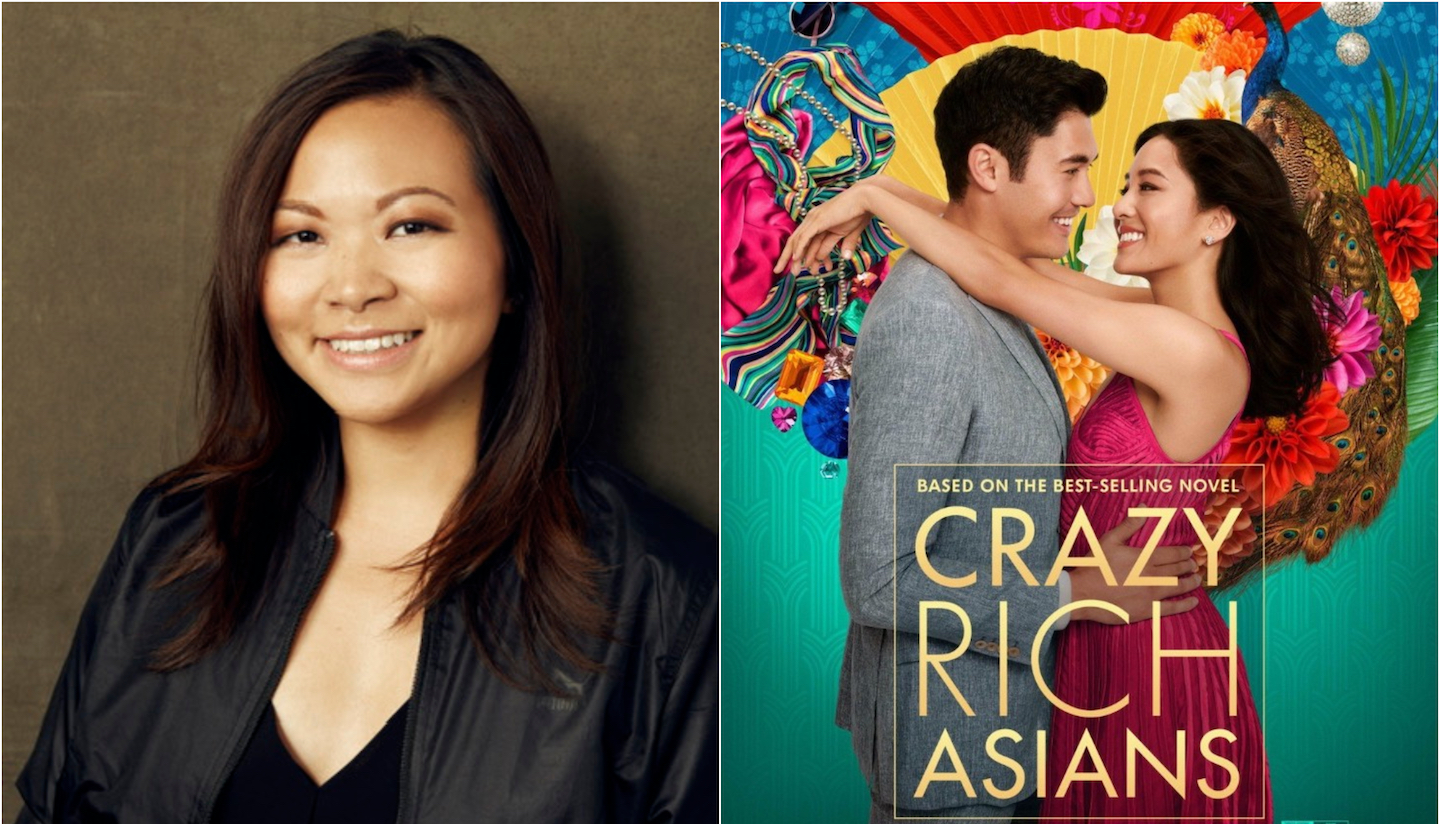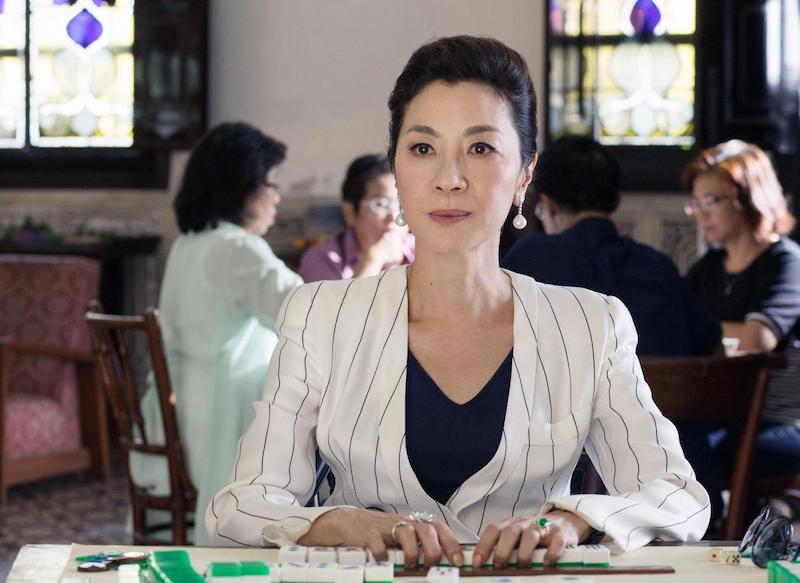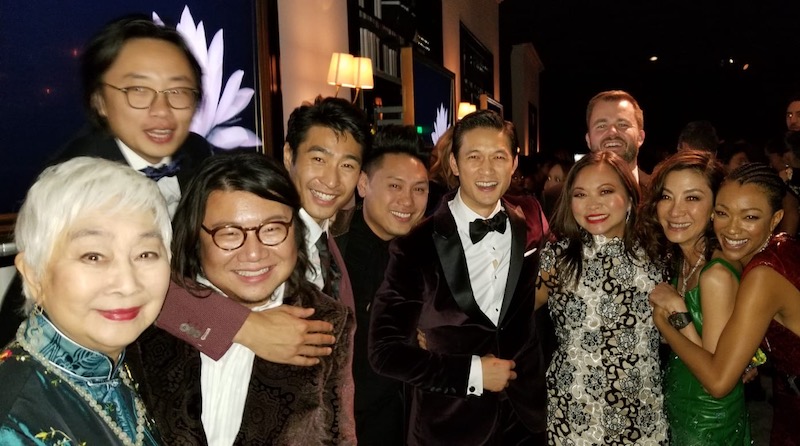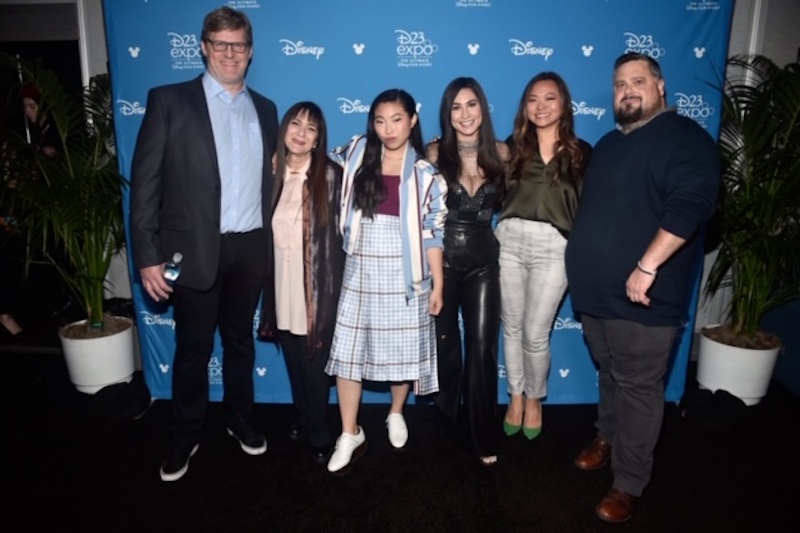
Malaysian-born screenwriter Adele Lim co-wrote the 2018 romcom blockbuster Crazy Rich Asians (Portrait credit: Adele Lim; Poster: Warner Bros)
You know you're pushing boundaries when Forbes writes a lengthy article analysing why underpaying you is a bad business move. It happened for Adele Lim, whose profile rose significantly with the success of Crazy Rich Asians the movie, and even more so when she chose to walk away as writer for the sequel when she found out she was offered only one-tenth the amount of co-screenwriter Peter Chiarelli.
The Petaling Jaya-born and bred Lim, who has had a successful career in American TV for close to two decades, was largely credited for bringing cultural authenticity to the script, which focuses on the Southeast Asian Chinese community, and was instrumental in introducing the famed mahjong scene in the film’s ending (it was not part of the book) that was lauded by audiences for being profound.
Options had the opportunity to speak to Lim as one of two Gamechangers recognised by the BOH Cameronian Arts Awards 2020 on her career, the current hunger for diverse and minority stories in the entertainment realm, and ultimately, what makes a good story.
What have you been working on lately?
I wrote a comedy with some friends of mine for fun, also Asian female writers – this was while I was working on Disney’s Raya and the Last Dragon, and we ended up selling it to Lionsgate studio. The Covid-19 pandemic put everything on pause, but when we were having meetings about production, they made me an offer to direct it. I don’t know if there’s still going to be a movie when we emerge from all this, but I was very excited about possibly directing my first film. For now, we’re just rewriting it.
It’s about a Chinese American girl adopted by white parents who grows up to be the very typical type A lawyer, very American, but ends up going back to Asia to look for her birth mother, except it’s also a big raunchy travel comedy. It’s rated R, a lot of nasty jokes – I don’t know if it’ll ever be played in Malaysia because of that. There is a really heart-warming component, but mostly just insane comedy.
I hope it shows here. But Raya and the Last Dragon has already generated a lot of buzz…
Oh, there’s so much ‘kick-assery’ in it, I cannot wait for the world to see it. It was my first time writing an animated feature and for Disney no less. Growing up in Malaysia, the first movie I watched was Snow White, and my grandmother would sing me all the songs. Now to have them set a movie in Southeast Asia – the directors were so taken by this region when they toured for inspiration – I could not be more excited about. I’m a KL / PJ girl, and we used to think that America and England are the only worlds we saw on screen. For me, Crazy Rich Asians was the first time it wasn’t just a Chinese story, but specifically a Southeast Asian Chinese experience, even though it was so heightened. To go from there to a story – albeit a fantasy – inspired by the cultures of Southeast Asia is fantastic for me. Even the naming of the character, Raya, it’s a celebration! To get to work with all these other Southeast Asian women as well in this project, it has a personal and special meaning for us.
mahjong_scene_crazy_rich_asians.jpg

This speaks of how far things have come in Hollywood for minority voices and stories. Am I right?
Oh absolutely, and I hope it's not a trend but something that's lasting. For most of my career in television, I wrote characters who were white and male. When I first started out, there were very few women in the TV writing space and even fewer women of colour. The difficulty with that was it means your story is not going to get told in the way you want. If you pitched a story with people who were not white in it, they tend to be cast a certain way. Even through my earliest shows, I would try to pitch out of the stereotype. For e.g., a guest character who is Asian but very charming and a ladies man. In the beginning, I would get a lot of pushback. But you have to keep trying.
Also, we always had to channel our experiences through this magic white man prism to be able to tell a story for American TV. But it's not because American audiences don't love other stories. In fact, every time there is something a little bit out of the box, whether it's Empire or Crazy Rich, you know, or Panther, audiences go insane for it because you know they've already seen the other stories. It's not [about one over the other], but there's just room for all of our stories and creators from different cultures and different races. We haven't even begun to scratch the surface of it.
When you walked away from the Crazy Rich Asians sequel due to pay disparity, it sparked significant outrage on your behalf. You mentioned it was like being treated as “soy sauce”. Was it difficult to take that stand?
I love the movie, I am still very good friends with the director, Jon Chu. I’m also very much friends with the cast and want nothing but the best for the franchise. I think, you know, walking away from it, even in retrospect, I'm very glad I did and it was the right decision for me. I think the difference is that most times when things like this happen, you don't really hear about it. And for a lot of writers in movies they tend to not want to be known as troublemakers or bring too much attention to these incidents because you can't control what people think. Some people might say 'oh, maybe you were offered less because you contributed less', but I knew that was not the case for me and I could not feel good about the project until I was being treated fairly.
It's too bad that it took that level of publicity and, honestly, shame for the studios to offer me a better deal, but by that time I'd already moved on to Raya. So, in the grand scheme of things, it all worked out. But I still want the best for Crazy Rich, for them to find a good writer with the right cultural understanding of where we come from, to be able to do the material justice.
Adele Lim CRA.jpeg

You’re very actively involved in your industry. You’re vocal about industry issues, especially with the Writers Guild of America, and is a well-known mentor. Can you share a bit more about that?
I think it comes from when I was coming up in the industry. It was very lonely as I was frequently the only woman or the only person of colour in the room. Even though there were a lot of senior white writers who were wonderful and very helpful to me, I never really had a personal mentor. And there's so much about writing that is not written in a textbook, not taught in schools. You really have to be on the ground, learning about the ins and outs of being a writer day by day, what it is like to really create something, to be a producer on set. It was really hard to break-in and climb from the bottom rungs, and we really want to encourage others, and help people get that support that maybe we didn't get then. And, you know, I think a big part of it too is about encouraging like a greater diversity of voices for entertainment, especially for those who may not have the right connections or went to the “right” schools. To have a bigger array of stories to tell – which I believe will only benefit Hollywood – only comes with having story creators who look different, sound different, and come from different backgrounds. I'm very passionate about that.
On that note, what does being a ‘gamechanger’ mean to you?
Firstly, it's a tremendous honour, particularly coming from Malaysia. You know growing up, being active in the arts wasn't necessarily seen as a good career choice, and probably still isn't for a lot of families. Really, what this signifies to me is the importance that has been placed on the arts in Malaysia today. We have so many different cultures and different art forms to be so proud of, and for them to be thought of as something negative or not worth pursuing as a career really should change, because it is the hallmark of any developed society that we treasure these artistic pursuits and celebrate them. For me to be named a gamechanger makes me feel so joyful for Malaysia, you know, and for the rest of my peers in entertainment back there.
If there's an opportunity to work here in Malaysia, what do you think it will look like?
My grandmother used to tell me all these amazing stories of the Japanese occupation. And I've always wanted to turn that into a television show. I also come from a Baba and Nyonya background – both my parents are peranakan – plus the influences of all my friendships growing up with the Chinese, Indians and Malays… I’ve always wanted to tell that story of this environment, but during World War II, from a female perspective, from my grandmother’s experience.
img_4478.jpeg

You’re in a great place in your career now. What’s next?
I've never been very good at structuring a plan. My mode of operation has always been ‘let's see what happens next’, and hopefully I can pay my bills. At least I can say I don't worry about paying the bills now… It’s a very exciting time in the industry. Lots of platforms are giving opportunities to voices that really hadn't had a voice before – Amazon, Hulu, Netflix, Apple TV, as well as film studios. As I mentioned earlier, I might be getting my first opportunity to direct, and now that I’ve had a taste of what it’s like to really tell stories from my upbringing and my culture, I don't think I can ever really go back. Not that I only want to tell Malaysian stories, but I want to tell stories that are that are authentic to me as an Asian woman in this world, and maybe all those crazy stories I used to hear from my grandmother and my aunties, the ones that haven’t been told before. Whether it's writing or directing or you know moving to a different platform, I think seeking out new challenges is also part of it.
At the heart of it, what do you think makes a good story?
I could talk about this for hours. But, at the heart of it, it is authenticity. You can have a driving story that is compelling and entertaining and have all the right ingredients, but at its core, something about it has to ring true, or have a character that feels real. Often, new writers try to write scripts that sound like other scripts or shows, but to work, it has to come from a personal space. I once worked with Jason Katims, the writer for Friday Night Lights, which is about American football. He is not an athletic guy, doesn’t play football, so how did he connect to the story? He said that the main character was a coach who went into a new town with a lot of expectations on him. And he related to that. Writing is a craft you can hone, but what makes a work amazing is that authentic original voice, and everybody has one. At the end of the day, we are all human, and we can always fall back on that experience. You might have something special if you can tap into that.
See all the winners of BOH Cameronian Arts Awards here.


